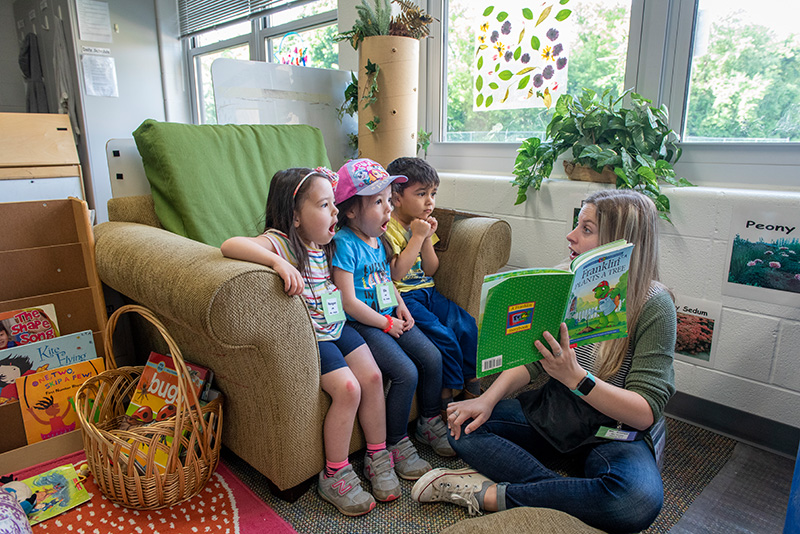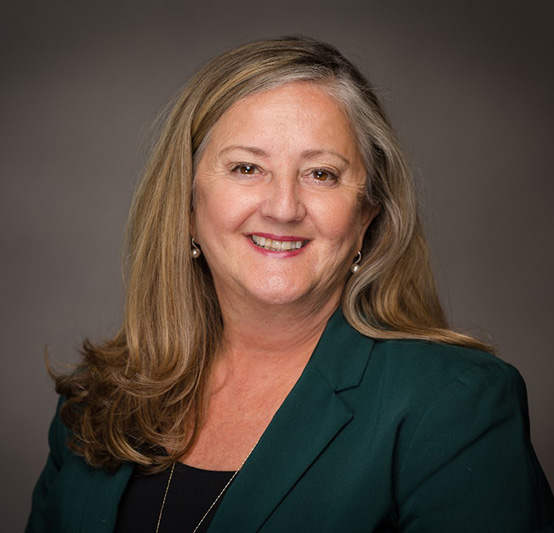MSU Child Development Laboratory Director reappointed to Governor’s Early Childhood Investment Corporation Executive Committee
August 26, 2021 - Katie Nicpon

Governor Gretchen Whitmer reappointed Laurie Linscott, director of the Michigan State University Child Development Laboratory, to her Early Childhood Investment Corporation Executive Committee as vice chair from July 30, 2021 through July 22, 2025.
The Early Childhood Investment Corporation (ECIC) was created to be the state's focal point for information and investment in early childhood education in Michigan so that children can arrive at the kindergarten door, safe, healthy, and eager for learning and life.
“I feel really great about the reappointment,” Linscott said. “My entire career has been spent in community collaboration working to help build systems that are unified to make it easier for children and families to access what they need.”
 Linscott is a Senior Academic Specialist who has served as the director of the Child Development Laboratories since YEAR. She joined the faculty of HDFS (formerly Family and Child Ecology) in 1999 as a Head Teacher where she worked with the MSU/C.A.C.S. Head Start Collaboration. In 2001, Laurie moved to Central School as Head Teacher. In addition to teacher training, she took on the role of Advisor for the Family and Child Ecology Club for the next 5 years.
Linscott is a Senior Academic Specialist who has served as the director of the Child Development Laboratories since YEAR. She joined the faculty of HDFS (formerly Family and Child Ecology) in 1999 as a Head Teacher where she worked with the MSU/C.A.C.S. Head Start Collaboration. In 2001, Laurie moved to Central School as Head Teacher. In addition to teacher training, she took on the role of Advisor for the Family and Child Ecology Club for the next 5 years.
Throughout her first appointment on the committee that began in 2017, Linscott witnessed Michigan communities gain greater awareness of and investment in early child care and education. The committee’s executive director prioritized diversifying funding and community investment. During this new term, Linscott hopes to continue the momentum around investment in early child care and education.
“We have businesses, chambers of commerce, early care and education settings all talking and planning together,” she said. “My vision is to continue that moment to become a system and not just a spark in this moment in time.”
Linscott’s second priority for her upcoming term is increasing the committee’s support for growth in the number of providers, locations and options for families.
“The number of people who are going into the field of early childhood and elementary education is decreasing; and the number of family homes, group homes and child care centers has been decreasing,” she explained. “So if you have a limited number of sites with a limited number of staffing, that limits opportunities for families. We’re really at a critical time to support recruitment, retention and continued training in the field with a worthy wage component.”
In addition to the ECIC, Linscott participates on a number of committees, helping to shape early child care and education opportunities in communities and throughout the state.
According to the Michigan Department of Education, children’s brains develop 80% between birth and the age of three.
“The research that continues to come out on brain development means that this is a significant time for us to support children and families and have accessible systems that do that,” Linscott said.
Her passion for building unified systems and helping families learn how to advocate for their children stems from her own experiences as a mother.
“My youngest daughter was two months premature, and we participated in Early On, which is a birth to three special education support,” she said. “At the time, everything was siloed: for example, if you were getting speech and language, which might be siloed from the medical part. As a parent I thought, ‘I have a graduate degree and I’m having a hard time navigating these systems!’”
As the director of the CDL, Linscott leads a dynamic team that provide quality care to local kids.
“Watching children grow is so rewarding, especially being part of the community you serve gives you a chance to see them grow up,” she said.
The CDL was created with a three-pronged mission: research, teaching and outreach. A center that provides quality early care and education, teacher training, and the opportunity to support research on child development, the CDL also helps families learn how to advocate for their children’s needs.
“And more rewarding is watching the graduates of our program grow and to see what they’re doing in the field when they go back to their communities -- how they’re transferring the knowledge here and embedding it in the community in a way that meets that community’s needs.”
The CDL also supports classroom inquiry and university research in child development and education. The research committee consists of Linscott, a Department of Human Development and Family Studies (HDFS) faculty member, the director at each CDL site and teacher representatives. This ensures that university research has a practical and meaningful application in real classroom settings.
“You can only have meaningful research and teacher education if you have high quality programs for families. That’s truly at the center of everything we do,” Linscott said.
Through her work with children in the classroom, her ability to train the next generation of early child care and education professionals, and her leadership in collaborating to build empowering systems for families, Linscott has spent her career making a difference across Michigan.
“Laurie’s appointment to the ECIC is a testament to her reputation as a leader in early childhood education and development and reflects the CDL and HDFS reputation as a valued asset,” said Mary Finn, PhD, Dean of the Michigan State University College of Social Science. “We appreciate her willingness to serve and represent us at such a critical time to shape public policy.”
To learn more about the MSU Child Development Lab’s programs, training and outreach, visit https://hdfs.msu.edu/cdl.

